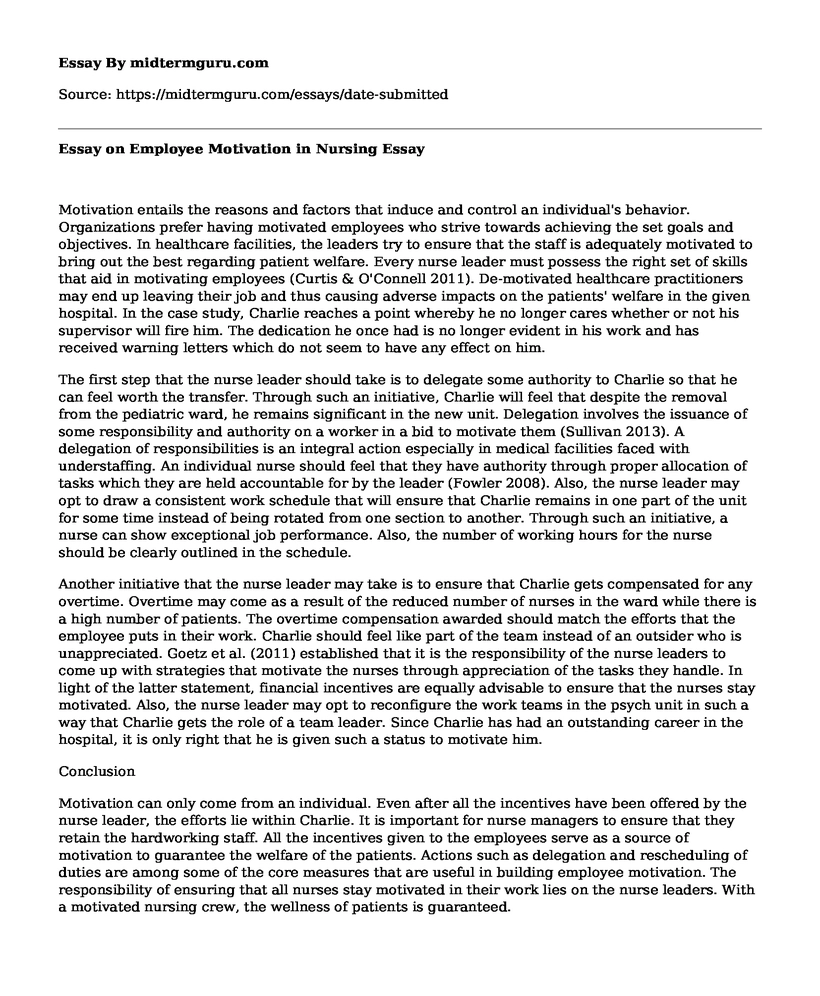Motivation entails the reasons and factors that induce and control an individual's behavior. Organizations prefer having motivated employees who strive towards achieving the set goals and objectives. In healthcare facilities, the leaders try to ensure that the staff is adequately motivated to bring out the best regarding patient welfare. Every nurse leader must possess the right set of skills that aid in motivating employees (Curtis & O'Connell 2011). De-motivated healthcare practitioners may end up leaving their job and thus causing adverse impacts on the patients' welfare in the given hospital. In the case study, Charlie reaches a point whereby he no longer cares whether or not his supervisor will fire him. The dedication he once had is no longer evident in his work and has received warning letters which do not seem to have any effect on him.
The first step that the nurse leader should take is to delegate some authority to Charlie so that he can feel worth the transfer. Through such an initiative, Charlie will feel that despite the removal from the pediatric ward, he remains significant in the new unit. Delegation involves the issuance of some responsibility and authority on a worker in a bid to motivate them (Sullivan 2013). A delegation of responsibilities is an integral action especially in medical facilities faced with understaffing. An individual nurse should feel that they have authority through proper allocation of tasks which they are held accountable for by the leader (Fowler 2008). Also, the nurse leader may opt to draw a consistent work schedule that will ensure that Charlie remains in one part of the unit for some time instead of being rotated from one section to another. Through such an initiative, a nurse can show exceptional job performance. Also, the number of working hours for the nurse should be clearly outlined in the schedule.
Another initiative that the nurse leader may take is to ensure that Charlie gets compensated for any overtime. Overtime may come as a result of the reduced number of nurses in the ward while there is a high number of patients. The overtime compensation awarded should match the efforts that the employee puts in their work. Charlie should feel like part of the team instead of an outsider who is unappreciated. Goetz et al. (2011) established that it is the responsibility of the nurse leaders to come up with strategies that motivate the nurses through appreciation of the tasks they handle. In light of the latter statement, financial incentives are equally advisable to ensure that the nurses stay motivated. Also, the nurse leader may opt to reconfigure the work teams in the psych unit in such a way that Charlie gets the role of a team leader. Since Charlie has had an outstanding career in the hospital, it is only right that he is given such a status to motivate him.
Conclusion
Motivation can only come from an individual. Even after all the incentives have been offered by the nurse leader, the efforts lie within Charlie. It is important for nurse managers to ensure that they retain the hardworking staff. All the incentives given to the employees serve as a source of motivation to guarantee the welfare of the patients. Actions such as delegation and rescheduling of duties are among some of the core measures that are useful in building employee motivation. The responsibility of ensuring that all nurses stay motivated in their work lies on the nurse leaders. With a motivated nursing crew, the wellness of patients is guaranteed.
References
Curtis, E., & O'Connell, R. (2011). Essential leadership skills for motivating and developing staff: An empowered team is enthusiastic about its work and will deliver high-quality care. The key, argue Elizabeth Curtis and Rhona O'Connell, is transformational leadership. Nursing Management, 18(5), 32-35.
Fowler, M. D. M. (2008). Guide to the code of ethics for nurses: Interpretation and application. Nursesbooks. org.
Goetz, K., Janney, M., & Ramsey, K. (2011). When nursing takes ownership of financial outcomes: Achieving exceptional financial performance through leadership, strategy, and execution. Nursing Economics, 29(4), 173.
Sullivan, E. J. (2013). Effective leadership and management in nursing. (8th ed.). Upper Saddle River: Pearson Prentice Hall.
Cite this page
Essay on Employee Motivation in Nursing . (2021, May 28). Retrieved from https://midtermguru.com/essays/date-submitted
If you are the original author of this essay and no longer wish to have it published on the midtermguru.com website, please click below to request its removal:
- Moral and Ethical Issues in Healthcare - Essay Example
- Exploring Diabetes as a Chronic Disease - Essay Sample
- Gender & Leadership: Impact on Organizational Performance - Essay Sample
- Organizational Culture: The Key to Adaptability and Growth - Research Paper
- Special Education: Supporting Inclusivity for All - Research Paper
- RR Communications: Four Autonomous Business Divisions - Essay Sample
- Vaccinations Don't Cause Autism: Argumentative Essay







